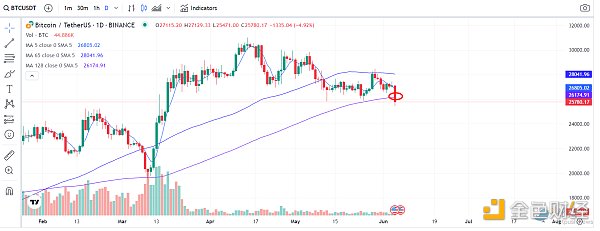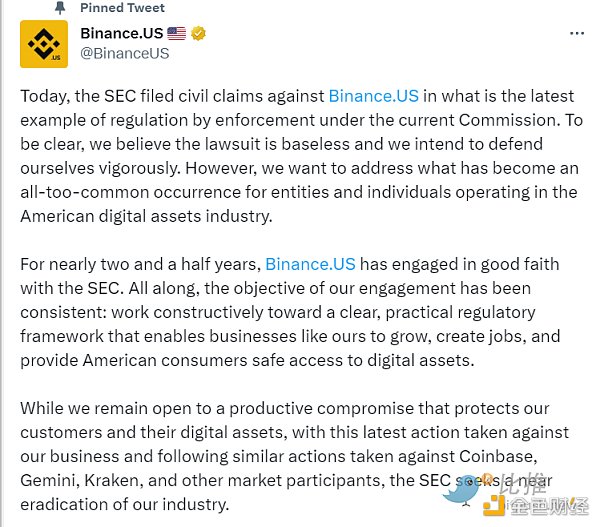Is Binance in trouble this time with “Li Chu” or “Taking on a Hot Potato”?
Is Binance facing trouble with "Li Chu" or a controversial situation?On June 5th, a Bloomberg article sparked market speculation that Richard Teng may replace Zhao Changpeng as CEO of Binance. Shortly after, Bloomberg reported that Binance and Zhao Changpeng were sued by the SEC, which triggered a cryptocurrency market crash. The regulatory crisis faced by Binance is obvious. Who is Richard Teng, and has he really been “appointed”? Can Binance survive this crisis? How will the cryptocurrency market develop in the future?
A figure emerges behind the scenes, and Binance urgently needs a “middleman”
On June 5th, according to Bloomberg, the U.S. Securities and Exchange Commission (SEC) sued Binance and its CEO Zhao Changpeng for violating U.S. securities trading rules. Later, Bloomberg disclosed that in the lawsuit documents against Binance, the SEC has classified SOL, ADA, MATIC, FIL, ATOM, SAND, MANA, ALGO, AXS, and COTI as securities. If this classification by the SEC is true, it will not only affect Binance, but also have a huge impact on the cryptocurrency market. The market has already expressed its “attitude” with its actions. From a technical chart perspective, BTC has fallen below the MA128 medium-term trend line, indicating that a larger downward trend seems to be brewing.
This time, the SEC may not simply sue and follow the process (we will discuss this in detail later). Because of the severity of this issue, the issue of Binance’s succession has been brought to the forefront. In addition, during this bear market, many cryptocurrency institutions have fallen one after another, but Binance seems to have turned bad luck into good. The figure behind Binance seems to have emerged.
- 13 Key Points to Understand the SEC’s Lawsuit Against Binance and Changpeng Zhao
- Is “Li Chu” still a “hot potato”? Is Binance in trouble this time?
- dYdX Founder: Hoping Cosmos’ influence doesn’t overshadow dYdX

From the resume of the rumored Binance leader Richard Teng, he worked for the Monetary Authority of Singapore for 13 years before joining Binance. Starting in 2007, he served as the chief regulator of the Singapore Securities Trading Platform (SGX) for nearly 8 years, responsible for the development of rules, frameworks, and policies for listing, trading, and clearing. After that, he served as the head of the financial services regulatory agency of the Abu Dhabi Global Market for 6 years. During Richard Teng’s tenure as CEO of ADGM’s FSRA, he launched multiple products, including digital banks, venture capital, financial technology regulatory sandboxes, private REIT systems, manager licensing systems, and digital asset trading frameworks. Richard Teng may not have been in the cryptocurrency industry for a long time, but his rich experience in government regulation and financial risk control is exactly what Binance needs as a “middleman” in the current regulatory dilemma.
From Richard Teng’s promotion history, the past two years in which he was promoted were also the most tumultuous two years in the cryptocurrency market, with many well-known cryptocurrency institutions and exchanges collapsing. This was also the most complex period for Binance to face regulatory challenges, especially given the behind-the-scenes maneuvers between Binance and FTX, which may have had the involvement of high-level authorities. Let’s take a look back at Richard Teng’s tenure at Binance. In August 2021, Richard Teng joined Binance as CEO of the Singapore region; from December 2021 to October 2022, Richard Teng served as the new head of the Middle East and North Africa region for Binance; from November 2022 to April 2023, Richard Teng served as the head of the Asia, Europe, Middle East, and Non-American regions, and was appointed to lead all regional markets outside the United States two months later. From a timeline perspective, Richard Teng was promoted four times in less than two years, and it is not an exaggeration to say that he is in the position of “crown prince”.
Prince-in-waiting or hot potato handler, Richard Teng may not be modest
From the level of internal messaging, Richard Teng’s “crown prince credentials” may have already formed internal consensus. According to Coindesk, a former Binance employee who requested anonymity revealed: “Senior leadership and regulatory agencies have all closed-door discussions and believe that Richard Teng is the only leader who can take over CZ and continue to build the company according to CZ’s vision, and Teng can also help bridge the existing gap between the industry and regulatory agencies.” For this executive, Binance co-founder He Yi also gave recognition in a recent interview, “I think he is an experienced professional manager, and since he joined Binance, his scope has been expanding, and we all like and recognize Richard.”
Richard Teng seems to be preparing to take over the work of Binance. Recently, Richard Teng has also frequently represented Binance in various activities and has been actively operating his Twitter account since May of this year. Of the total of 29 tweets, as many as 28 have been posted since May, indicating that Richard Teng has significantly increased his external frequency on behalf of Binance after his latest promotion.
But in essence, Richard Teng is at most a “working emperor”, a suitable “middleman” for Binance during the transition to compliance, and will not be responsible for Binance’s past problems; in the future, even if Zhao Changpeng resigns as CEO due to litigation issues, the new “CEO” will also have He Yi “behind the scenes”. The current Binance is more like a “hot potato”, so it is naturally not a “succession in order of rank, prince succession” during peacetime, so Teng’s response to external speculation is not modest. When responding to the media on June 6th, Teng emphasized that Binance acknowledges past compliance issues, but in the past 18 to 24 months, there has been a major turnaround. We hope to work with all parties in a responsible manner to resolve all these policy issues and continue to demonstrate that we are a new organization. In addition, Teng recently told CoinDesk that it is too early to speculate that he has been trained to be the new CEO to replace CZ, and the new position is not a promotion, but only expands the responsibilities of helping CZ review certain things.
Under Regulation, Binance Struggles and Crypto Markets Tiptoe
In February of this year, Blockingxos was ordered to stop issuing new BUSD, and Binance’s stablecoin business became unsustainable. In March, the US Commodity Futures Trading Commission (CFTC) sued Binance and Zhao Changpeng for violating regulations and sought permanent trading and registration bans. In addition, regulatory agencies in Australia, Canada, Dubai, and other places are also strengthening regulatory policies on Binance, forcing it to suspend operations in related regions. From March to the present, Binance’s market share has dropped by about 10.8%, and regulation is undoubtedly the main factor affecting this. After Binance’s “disaster,” this is not the end, but only the beginning.
Since FTX’s explosion last year, Silicon Valley Bank and Silvergate have also gone bankrupt this year, and regulation in the crypto market has been tightening, perhaps it is time to start tightening the net. Earlier this year, the Federal Reserve and other regulatory agencies issued warnings to the banking industry about “cryptocurrency risks.” According to Blocking, in March, the Federal Reserve explicitly rejected Custodia Bank’s membership application. On March 13, US President Biden said he was pleased that the Treasury Department had quickly resolved Silicon Valley Bank’s issues and planned to continue to strengthen regulation of large banks by holding those responsible for “this turmoil” accountable.
Frank Charroro, news director of The Block, tweeted that crypto-friendly bank Signature Bank was closed by New York state regulators on Sunday. This will make it extremely difficult and absolutely brutal for crypto companies’ banking operations. The capital markets for cryptocurrencies are basically back to before 2014. Any new company has no chance of getting a banking relationship. In many ways, the cryptocurrency industry has officially lacked banking services.
Summary
The United States has been conducting targeted surgery on the crypto market this year, first doing “surgery,” mainly cutting off the traditional financial and crypto industries in the United States; then conducting “internal surgery” on the crypto market, targeting major participants in the crypto market one by one. Overall, as Binance.US tweeted, “The SEC seems to be trying to eliminate our industry.”
Regarding the future, perhaps Binance.US’s claim may be a good solution: “Hope that the SEC can establish a clear and practical regulatory framework in a constructive way, so that similar enterprises can grow and create employment opportunities; call on Congress to intervene and pass bipartisan legislation to create a feasible regulatory system for digital assets, and control excessive bureaucratic behavior.”

We will continue to update Blocking; if you have any questions or suggestions, please contact us!
Was this article helpful?
93 out of 132 found this helpful
Related articles
- Exclusive Interview with Vechain Founder Sunny: From LV to Crypto World, Web3 is the Perfect Answer for Sustainable Development
- Why is Zhao Changpeng the “heir”?
- Will “Rare Cong” be the next crypto craze?
- Why is Polkadot called Layer 0?
- Ten Questions About the Metaverse: Is There Still Hope for Virtual Land?
- Analysis of Binance’s new coin investment returns: What are the reasons behind the poor performance?
- Understanding the Opside ZK-PoW Algorithm Mechanism and Potential: How to Improve ZKP Generation Efficiency by 80%?






